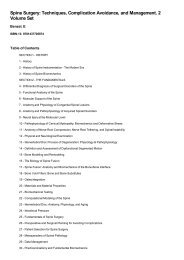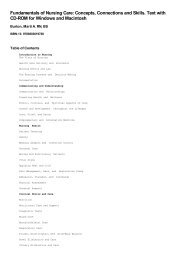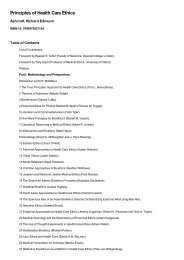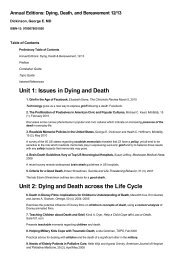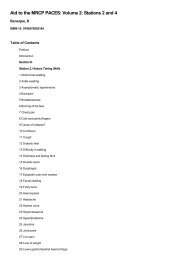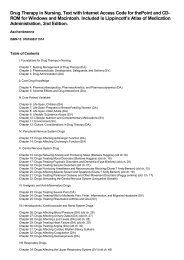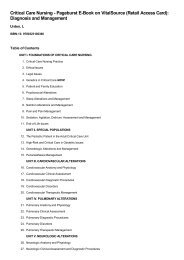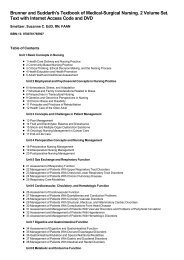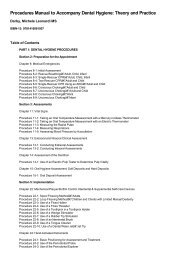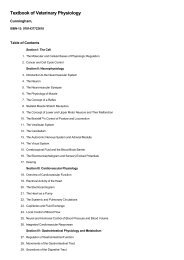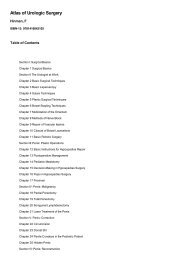Table of Contents for (9780415977449) American Civil War by ...
Table of Contents for (9780415977449) American Civil War by ...
Table of Contents for (9780415977449) American Civil War by ...
You also want an ePaper? Increase the reach of your titles
YUMPU automatically turns print PDFs into web optimized ePapers that Google loves.
<strong>American</strong> <strong>Civil</strong> <strong>War</strong><br />
Finseth, Ian Frederick<br />
ISBN-13: <strong>9780415977449</strong><br />
<strong>Table</strong> <strong>of</strong> <strong>Contents</strong><br />
Acknowledgements<br />
Illustrations<br />
List Introduction: The Written <strong>War</strong><br />
I. ORIGINS<br />
Herman Melville<br />
from Battle-Pieces and Aspects <strong>of</strong> the <strong>War</strong> (1866)<br />
"The Portent"<br />
"Misgivings"<br />
Walt Whitman<br />
from Collect (1882)<br />
"Origins <strong>of</strong> Attempted Secession"<br />
Ulysses S. Grant<br />
from Personal Memoirs <strong>of</strong> U. S. Grant (1885-86)<br />
Chapter XVI – Resignation – Private Life – Life at Galena – The Coming Crisis<br />
Jefferson Davis<br />
"Speech in U.S. Senate (Farewell Address)" (Jan. 21, 1861)<br />
Henry Timrod<br />
"Ethnogenesis" (February 1861)<br />
Abraham Lincoln<br />
First Inaugural Address (Mar. 4, 1861)<br />
Mary Boykin Chesnut<br />
from A Diary from Dixie (1905)<br />
Chapter 2: Montgomery, Ala., February 19, 1861 – March 11, 1861<br />
Walt Whitman<br />
from Drum-Taps (1865)<br />
"Drum-Taps"<br />
Emily Dickinson<br />
"A Day! Help! Help!" (1859)<br />
"Success – is counted sweetest" (1859, 1862)<br />
II. BATTLEFIELDS
Herman Melville<br />
from Battle-Pieces and Aspects <strong>of</strong> the <strong>War</strong> (1866)<br />
"The March into Virginia"<br />
"A Utilitarian Account <strong>of</strong> the Monitor’s Fight with the Merrimac"<br />
"Shiloh: A Requiem (April, 1862)"<br />
"Malvern Hill (July, 1862)"<br />
"The Swamp Angel"<br />
George Moses Horton<br />
from Naked Genius (1865)<br />
"The Dying Soldier’s Message"<br />
"Execution <strong>of</strong> Private Henry Anderson"<br />
"The Spectator <strong>of</strong> the Battle <strong>of</strong> Belmont, November 6, 1863"<br />
"The Terrors <strong>of</strong> <strong>War</strong>"<br />
Sarah Morgan Bryan Piatt<br />
"Hearing the Battle July 21, 1861" (1864)<br />
Henry Wadsworth Longfellow<br />
"The Cumberland" (December 1862)<br />
"Killed at the Ford" (April 1866)<br />
Lucy Larcom<br />
from Songs <strong>for</strong> <strong>War</strong> Time (1863)<br />
"The Sinking <strong>of</strong> the Merrimack"<br />
Walt Whitman<br />
from Specimen Days (1882)<br />
"A Night Battle, Over a Week Since"<br />
"A Glimpse <strong>of</strong> <strong>War</strong>’s Hell-Scenes"<br />
"The Weather. – Does It Sympathize with These Times?"<br />
"Two Brothers, One South, One North"<br />
from Drum-Taps (1865)<br />
"By the Bivouac’s Fitful Flame"<br />
"The Dresser"<br />
"Vigil Strange I Kept on the Field One Night"<br />
"Camps <strong>of</strong> Green"<br />
S. Weir Mitchell<br />
"The Case <strong>of</strong> George Dedlow" (1866)<br />
Helen Hunt Jackson<br />
from Sonnets and Lyrics (1886)<br />
"Songs <strong>of</strong> Battle"<br />
Louisa May Alcott<br />
from Hospital Sketches (1863)
Chapter III: "A Day"<br />
Abraham Lincoln<br />
"Address at the Dedication <strong>of</strong> the Gettysburg National Cemetery" (Nov. 19, 1863)<br />
Emily Dickinson<br />
"To fight aloud is very brave –" (1860)<br />
"The name – <strong>of</strong> it – is ‘Autumn’ –" (1862)<br />
"Whole Gulfs – <strong>of</strong> Red, and Fleets – <strong>of</strong> Red –" (1862)<br />
"They dropped like Flakes –" (1863)<br />
"If any sink, assure that this, now standing –" (1863)<br />
"The Battle fought between the Soul" (1862)<br />
"My Portion is Defeat – today –" (1863)<br />
"The hallowing <strong>of</strong> Pain" (1863)<br />
Ambrose Bierce<br />
from Bits <strong>of</strong> Autobiography (1909)<br />
"On a Mountain"<br />
from Tales <strong>of</strong> Soldiers and <strong>Civil</strong>ians (1891)<br />
"A Horseman in the Sky"<br />
"A Son <strong>of</strong> the Gods"<br />
"One <strong>of</strong> the Missing"<br />
from Can Such Things Be? (1893)<br />
"A Tough Tussle"<br />
Stephen Crane<br />
from The Little Regiment, and Other Stories <strong>of</strong> the <strong>American</strong> <strong>Civil</strong> <strong>War</strong> (1896)<br />
"A Gray Sleeve"<br />
"An Episode <strong>of</strong> <strong>War</strong>"<br />
"A Mystery <strong>of</strong> Heroism"<br />
Ulysses S. Grant<br />
from Personal Memoirs <strong>of</strong> U. S. Grant (1885-86)<br />
Chapter 67: Negotiations at Appomattox – Interview with Lee at McLean’s House – The Terms <strong>of</strong><br />
Surrender – Lee’s Surrender – Interview with Lee after the Surrender<br />
William T. Sherman<br />
from Memoirs <strong>of</strong> General William T. Sherman, Written <strong>by</strong> Himself (1875)<br />
Chapter 24: Conclusion – Military Lessons <strong>of</strong> the <strong>War</strong><br />
III. AFRICAN AMERICAN EXPERIENCE<br />
George Moses Horton
from Naked Genius (1865)<br />
"The Slave"<br />
Susie King Taylor<br />
Reminiscences <strong>of</strong> My Life in Camp (1902)<br />
Thomas Wentworth Higginson<br />
from Army Life in a Black Regiment (1869)<br />
"Camp Diary"<br />
Rebecca Harding Davis<br />
"John Lamar" (1862)<br />
Abraham Lincoln<br />
"Final Emancipation Proclamation" (Sept. 22, 1862)<br />
Ralph Waldo Emerson<br />
"The Emancipation Proclamation" (1862)<br />
"Boston Hymn" (1863)<br />
"Voluntaries" (1863)<br />
Frederick Douglass<br />
"The Mission <strong>of</strong> the <strong>War</strong>" (1863)<br />
Louisa May Alcott<br />
from Hospital Sketches and Camp and Fireside Stories (1869)<br />
"My Contraband"<br />
Charles Chesnutt<br />
from The Wife <strong>of</strong> His Youth and Other Stories <strong>of</strong> the Color Line (1899)<br />
"Cicely’s Dream"<br />
Paul Laurence Dunbar<br />
"The Deserted Plantation"<br />
"When Dey ‘Listed Colored Soldiers" (August 1899)<br />
"Robert Gould Shaw" (October 1900)<br />
W. E. B. Du Bois<br />
from The Souls <strong>of</strong> Black Folk (1903)<br />
Chapter 1: Of Our Spiritual Strivings<br />
Chapter 2: Of the Dawn <strong>of</strong> Freedom<br />
IV. THE CIVIL WAR IN SONG<br />
Daniel Emmett<br />
"Dixie’s Land" (1859, 1860)<br />
Anonymous<br />
"John Brown’s Body" (1859?)<br />
Septimus Winner<br />
"Abraham’s Daughter (Raw Recruits)" (1861)
A. E. Blackmar<br />
"Allons Enfans (The Southern Marseillaise)" (1861)<br />
William B. Bradbury<br />
"Marching Along" (1861)<br />
Ethel Lynn Beers<br />
"All Quiet Along the Potomac" (1861)<br />
Harry McCarthy<br />
"The Bonnie Blue Flag" (1861)<br />
Julia <strong>War</strong>d Howe<br />
"The Battle Hymn <strong>of</strong> the Republic" (1862)<br />
Walter Kittredge<br />
"Tenting on the Old Campground" (1862)<br />
Charles Carroll Sawyer and Henry Tucker<br />
"Weeping, Sad and Lonely; or, When This Cruel <strong>War</strong> Is Over" (1862)<br />
Anonymous<br />
"Parody on When this Cruel <strong>War</strong> is Over"<br />
A. E. Blackmar<br />
"Goober Peas" (1866)<br />
M. B. Smith<br />
"The Battle <strong>of</strong> Shiloh Hill" (1863)<br />
Patrick S. Gilmore<br />
"When Johnny Comes Marching Home" (1863)<br />
George F. Root<br />
"Tramp! Tramp! Tramp! (The Prisoner’s Hope)" (1863)<br />
"Just Be<strong>for</strong>e the Battle, Mother"<br />
Henry C. Work<br />
"Marching through Georgia" (1865)<br />
Thomas Wentworth Higginson<br />
"Negro Spirituals" (1867)<br />
V. THE HOME FRONT<br />
Harriet Beecher Stowe<br />
"The Chimney-Corner" (January 1865)<br />
Nathaniel Hawthorne<br />
"Chiefly about <strong>War</strong>-Matters" (July 1862)<br />
Julia <strong>War</strong>d Howe<br />
"Our Orders"<br />
Lucy Larcom<br />
"Weaving"
"A Loyal Woman’s No"<br />
Sarah Morgan Bryan Piatt<br />
"Giving Back the Flower" (1867)<br />
Walt Whitman<br />
from Drum-Taps (1865)<br />
"Come Up from the Fields Father"<br />
Kate Chopin<br />
from Bayou Folk (1894)<br />
"A Wizard from Gettysburg" (1892)<br />
Henry James<br />
"The Story <strong>of</strong> a Year" (March 1865)<br />
Harold Frederic<br />
from Marsena and Other Stories <strong>of</strong> the <strong>War</strong>time (1894)<br />
"The <strong>War</strong> Widow"<br />
Hamlin Garland<br />
from Main-Travelled Roads (1891)<br />
"The Return <strong>of</strong> a Private"<br />
VI. REMEMBRANCE AND FORGETTING<br />
Abraham Lincoln<br />
"Second Inaugural Address" (March 4, 1865)<br />
John Wilkes Booth<br />
To Mary Ann Holmes Booth (November 1864)<br />
To the Editors <strong>of</strong> National Intelligencer (April 14, 1865)<br />
diary entries (April 17, 1865; April 22, 1865)<br />
Walt Whitman<br />
from Sequel to Drum-Taps (1865-66)<br />
"When Lilacs Last in the Door-Yard Bloom’d"<br />
from Drum-Taps (1865)<br />
"The Veteran’s Vision"<br />
from Specimen Days (1882)<br />
"The Million Dead, Too, Summ’d Up"<br />
"The Real <strong>War</strong> Will Never Get in the Books"<br />
Edward Alfred Pollard<br />
from The Lost Cause: A New Southern History <strong>of</strong> the <strong>War</strong> <strong>of</strong> the Confederates (1867)<br />
Francis Miles Finch<br />
"The Blue and the Gray" (Sept. 1867)<br />
Herman Melville<br />
from Battle-Pieces and Aspects <strong>of</strong> the <strong>War</strong> (1866)<br />
"An Uninscribed Monument"
"A Requiem"<br />
"On a Natural Monument"<br />
Frederick Douglass<br />
"Address on the Unknown Dead" (1871)<br />
Oliver Wendell Holmes, Jr.<br />
"Memorial Day" (1895)<br />
D. B. Lucas<br />
"In the Land Where We Were Dreaming"<br />
Ambrose Bierce<br />
from Antepenultimata (1912)<br />
"A Bivouac <strong>of</strong> the Dead" (1903)<br />
Albion Tourgée<br />
"The South as a Field <strong>for</strong> Fiction"<br />
Jefferson Davis<br />
"Speech be<strong>for</strong>e Mississippi Legislature in Jackson, Mississippi" (March 10, 1884)<br />
Sidney Lanier<br />
"The Dying Words <strong>of</strong> Stonewall Jackson" (Sept. 1865)<br />
"Laughter in the Senate"<br />
"Resurrection"<br />
Sarah Morgan Bryan Piatt<br />
"Army <strong>of</strong> Occupation" (1866)<br />
"Over in Kentucky"<br />
"Another <strong>War</strong>"<br />
"The Grave at Frank<strong>for</strong>t"<br />
Lizette Woodworth Reese<br />
from Spicewood (1920)<br />
"A <strong>War</strong> Memory" (1865)<br />
Joel Chandler Harris<br />
from Uncle Remus: His Songs and Sayings (1880)<br />
"A Story <strong>of</strong> the <strong>War</strong>" (1877)<br />
Samuel R. Watkins<br />
from Co. Aytch (1882)<br />
Chapter 1: Retrospective<br />
Chapter 8: Chattanooga<br />
Chapter 17: The Surrender<br />
Stephen Crane<br />
from The Little Regiment, and Other Episodes <strong>of</strong> the <strong>American</strong> <strong>Civil</strong> <strong>War</strong> (1896)<br />
"The Veteran"<br />
from <strong>War</strong> Is Kind (1896)
"<strong>War</strong> is Kind" (1896)<br />
"The Battle Hymn"<br />
Emily Dickinson<br />
"My Triumph lasted till the Drums" (1871)<br />
"‘Tis Seasons since the Dimpled <strong>War</strong>" (1881)<br />
Glossary<br />
The Writers<br />
Index




